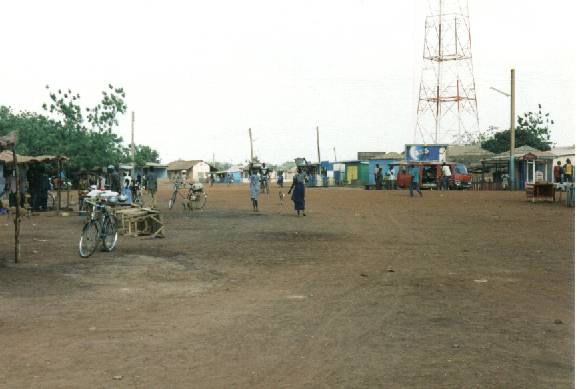|
|
 |
|
|
|
|
|
|
|
|
|
|
|
|
|
|
|
|
|
|
 |
|
|
|
|
|
|
|
|
|
|
|
|
|
|
|
|
Lawra is one of seven district capitals in the Upper West. It is situated about 82km north of Wa, the regional capital. To the north runs the road to Nandom and Hamile where it crosses into Burkina Faso. To the east, lie Tumu and then Tamale. About 2 km to the west is the Black Volta river which forms the border with Burkina Faso. The following pages will give an idea of what the town is like to both visit and live in. Lawra is probably most famous for its locally made xylophones and music and the Kobena festival in October each year. Lawra has a six day 'weekly' market as well as a few useful shops in the town. The indigenous people in Lawra are Dagaarti who speak Dagaari. Click on the hyperlinks by the side of the picture above, or the icons below to visit a particular area.
This picture is taken in the middle of Lawra town looking across the main road. To the left you can see up-turned little tables where from morning till evening women sell a variety food to both town people and passing travellers on large buses and smaller vans. In the centre of the picture you can see two women carrying large pans on their heads, probably full of water, pito, cereal crops or charcoal. To the centre right is the base of the communication's tower which allows digital direct dialling from Lawra to the rest of Ghana and Internationally. You can also see four or so electricity poles. Up until 1998, the town was supplied electricity by a large diesel generator housed a few hundred metres away on the Nandom road. Although the supply was only for about four hours a day, and as many days a week, it was greatly welcome powering fans and chilling bottled beer in the many small bars scattered around town. The bars in Lawra, as in most parts of Ghana, have wonderful names such as 'Mobile View' which is situated directly opposite the Mobile petrol station, a few metres up 'Old Timers' and just to the left of the photo 'Quality Bar'. I'd have to recommend 'Old Timers' and ABC beer. If you take a bottle here, say hello to Mother from Mr. Andrews!
There's a Post Office and Ghana Commercial Bank in Lawra, although if you're travelling through and looking to change money, neither do. If you've got a day or two to spend here, there's more to see than first impressions might suggest. The Black Volta is less than two kilometres to the West. it's a wonderful place to swim - don't worry about river parasites, I never picked any up from the river in nearly five years. There are many fishermen along the river who are very friendly and I'm sure would take you for a quiet ride whilst they work. There is also a crocodile pond where the women come and get their water. There are crocodiles there, but they never attack the women collecting water who will enter the pond with pans on their heads, completely submerge them whilst still balanced on their heads, stand up and then walk out. If you really want to see lots of crocodiles and you're there in the dry season, try to travel the 5 or so kilometres from Lawra to the east on the Dafiama road near a village called Eremon. Here, the local village chief's house has a pond no larger than a football pitch in the dry season where literally dozens of crocodiles live. In many parts of the Upper West, crocodiles are sacred and seem to share a small area quite peacably with the villagers. If you have the time to move around the sorrounding vallages you'll see some of the more traditional buildings and features of rural life in the Upper West.
I lived in or very close to Lawra for five years between 1994 and 1998 whilst working through VSO at the Secondary School